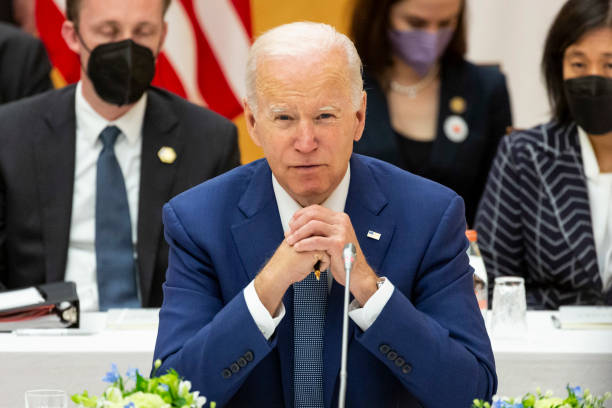
US President Joe Biden stated on Tuesday that there was no change to the US policy of “strategic ambiguity” towards Taiwan, a day after he appeared to push the boundaries of the US position on the island by stating that he would be prepared to use force to defend it.
The question of Taiwan hovers over a summit of leaders of the Quad Meet of the United States, Japan, Australia, and India, who have emphasised their resolve to guarantee a free and open Indo-Pacific area in the face of China’s growing assertiveness.
While the United States is required by law to provide self-governed Taiwan with the means to defend itself, it has long followed a policy of “strategic ambiguity” regarding whether it would intervene militarily to protect Taiwan in the event of a Chinese attack — a convention that Biden appeared to break on Monday.

Image credit:- Financial Times
China views Taiwan as an integral part of its territory and identifies it as the most delicate and significant subject in its dealings with the United States.
Biden’s Monday remark, in which he offered US military help for Taiwan, was the most recent in a series of seemingly off-the-cuff statements that indicate his personal desire to protect Taiwan.
Some opponents have asserted that Obama misspoke on the topic or committed a blunder and that his ambiguous statements on the matter risked speeding China’s determination to act without a formal security assurance.
Other policy analysts, however, have argued that given Biden’s significant expertise in international policy and the environment in which he made the statements (next to Japan’s prime minister and after the Russian invasion of Ukraine), he did not make a mistake.
Taiwan was not an official topic on the Quad agenda, and President Biden focused more on Ukraine, denouncing Russia’s incursion as a global concern.
“Russia’s aggression against Ukraine simply heightens the relevance of fundamental principles of international order, territorial integrity, and sovereignty,” “International law and human rights must always be upheld, no matter where in the globe they are infringed,” he stated.
Biden stated that the United States would advocate for a free and open Indo-Pacific alongside its “close democratic friends.”
The United States has been disappointed by India’s perceived lack of support for US-led sanctions on Russia and criticism of its invasion.
Despite the fact that India has forged tight relationships with the United States in recent years and is a key member of the Quad grouping geared at countering China, it still has a long-standing relationship with Russia, which remains a significant source of its defence equipment and oil supplies.
India abstained from the UN Security Council voting on Russia’s invasion of Ukraine, but it did express worry about the deaths of some Ukrainian citizens.
Anthony Albanese, the new prime minister of Australia, stated that his objectives agreed with those of the Quad and urged his fellow leaders to take the lead on climate change. He continued, “The region wants us to engage with them and set an example.” “As a result, my administration will take serious action on climate change and increase our support for regional allies as they work to address the issue, including the release of more financing.”
China has been expanding its influence in the Pacific, where island nations face some of the greatest threats from rising sea levels.
Regarding India’s position on Ukraine, a US official stated that Biden, who is scheduled to hold bilateral talks with Modi later on Tuesday, will seek common ground while emphasizing the need for a face-to-face encounter.
“It’s true that there are disagreements among the quad members, but the point is how they are addressed and controlled,” the official told reporters before the negotiations.













